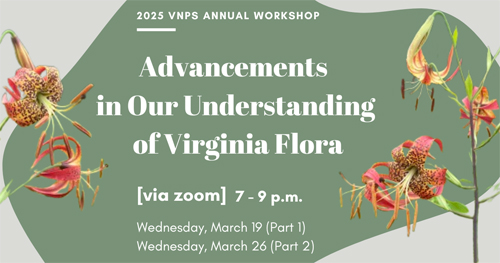VNPS Annual Workshop 2025 (via Zoom)
Date/Time
Wednesday, March 19, 2025 to Wednesday, March 26, 2025
6:30 pm - 9:00 pm
Categories
Enjoy two evening workshops, Wednesdays, 19 March and 26 March 2025, via Zoom starting at 6:30 PM for meet and greet. Sessions start at 7 PM and 8 PM both evenings.
View video recordings of both sessions.

Wednesday, 19 March 2025
6:30 PM
Zoom Meet & Greet
6:50 PM
Welcome and Introduction
Nancy Vehrs, VNPS President
Maeve Coker, VNPS Education Chair
7:00 PM
When butterflies beat the birds and the bees: Investigating an overlooked mode of pollination in Rhododendron and Lilium
Dr. Mary Jane Epps
In her previous work focusing on Flame Azaleas, Rhododendron calendulaceum, Mary Jane found evidence of ‘wing-mediated’ pollination via large butterflies. Springboarding from her globally significant flame azalea work, Mary Jane will discuss her continued investigation of wing-mediated pollination in other azaleas, as well as two Lilium species.
 Dr. Mary Jane Epps is an associate professor of biology at Mary Baldwin University, where she teaches botany, ecology, entomology, and conservation biology. Following a bachelor’s degree at Duke University she earned a Ph. D. in 2012 studying fungal-insect interactions at the University of Arizona, and completed postdoctoral research at NC State University in 2015. As an ecologist with a strong emphasis on natural history, her research explores various interactions between plants, fungi, and insects, as well as the biology of rare species.
Dr. Mary Jane Epps is an associate professor of biology at Mary Baldwin University, where she teaches botany, ecology, entomology, and conservation biology. Following a bachelor’s degree at Duke University she earned a Ph. D. in 2012 studying fungal-insect interactions at the University of Arizona, and completed postdoctoral research at NC State University in 2015. As an ecologist with a strong emphasis on natural history, her research explores various interactions between plants, fungi, and insects, as well as the biology of rare species.
8:00 PM
Clonal population structure is highly aggregated yet supportive of fitness in Common Milkweed (Asclepias syriaca)
Hannah Machiorlete
The overwhelming majority of plants are capable of reproducing asexually in one form or another, yet scientists have left out this critical piece of information from their plant population dynamics models – until now. In her talk about her graduate research, Hannah will discuss Common Milkweed, how it achieves high genetic diversity despite its ability to clone itself, and what it all means for the Monarch Butterfly.
 Hannah Machiorlete is an ecology research assistant at Archbold Biological Station in South-central Florida. There, she manages long-term demographic studies of Florida scrub plants, some of the rarest and imperiled in the US. Her research employs fieldwork, genetics, and computation to understand the role of reproduction in plant ecology, evolution, and population biology. She holds a MS in Biology from the College of William & Mary in Williamsburg, Virginia, and a Bachelor’s in Biology from Lewis & Clark College in Portland, Oregon. Though impossible to pick, her favorite plant family is Asteraceae (the sunflower family).
Hannah Machiorlete is an ecology research assistant at Archbold Biological Station in South-central Florida. There, she manages long-term demographic studies of Florida scrub plants, some of the rarest and imperiled in the US. Her research employs fieldwork, genetics, and computation to understand the role of reproduction in plant ecology, evolution, and population biology. She holds a MS in Biology from the College of William & Mary in Williamsburg, Virginia, and a Bachelor’s in Biology from Lewis & Clark College in Portland, Oregon. Though impossible to pick, her favorite plant family is Asteraceae (the sunflower family).
Wednesday, 26 March 2025
6:30 PM
Zoom Meet & Greet
6:50 PM
Welcome and Introduction
Nancy Vehrs, VNPS President
Maeve Coker, VNPS Education Chair
7:00 PM
Virginia Violets Old, Virginia Violets New, Some Brought Back to Life Again, and Some Peculiar, Too
Dr. Harvey Ballard
Together Virginia and North Carolina host the greatest diversity of eastern North American violets, supporting 57 known species in the Viola genus. During his talk, Dr. Harvey Ballard will showcase his research on understanding and further describing the status of Viola in the two states, as well as working toward formally describing several newly discovered species.
 Dr. Harvey Ballard is Professor of Plant Biology at Ohio University and the recipient of past VNPS Research Grants. He writes:
Dr. Harvey Ballard is Professor of Plant Biology at Ohio University and the recipient of past VNPS Research Grants. He writes:
“My studies in plant taxonomy, with a focus on violets, began in high school. Visiting a local herbarium, I discovered a specimen of a hybrid of the Prairie Bird’s-foot Violet (Viola pedatifida) and Common Blue Violet (Viola sororia) from a railroad prairie near my home that violet specialist Norman Russell called the “westernmost disjunct location for Appalachian V. palmata.” That got me fired up. After my Bachelor’s degree at Kalamazoo College, Master’s degree at Central Michigan University, and Ph.D. at the University of Wisconsin, I spent much of my taxonomic life largely accepting the very broad species concepts of Russell and other specialists since the middle of the last century. In 2012, however, I took a mindbending opportunity from the Mountain Lake Biological Station to spend three weeks studying violets with Tom Weiboldt and Johnny Townsend. I suddenly realized that there was a whole new world of violet diversity right under our noses, half of which couldn’t be supported by any taxonomic concepts coming down from specialists in “the North.” A year-long reading frenzy of literature on North American violets, species concepts and evolutionary theory made me rethink my whole taxonomic approach to violets. Since then, my students and I have been systematically reexamining eastern North American violet groups using a diversified, intensive and integrative approach. My colleagues John Kartesz and Misako Nishino and I published a summary monograph of what we know about northeastern North American violets in early 2023. To date, collective studies by our lab and collaborators have revealed over 20 confirmed and potentially new species in the region, several of these in Virginia and North Carolina. In 2024, the Virginia Native Plant Society graciously awarded me funds to conduct Year 1 herbarium studies of violets in Virginia and North Carolina.
“Tonight, I will brief you on those results and introduce you to the incredibly diverse Virginia violet flora, as well as highlights of proposed Year 2 field studies in Virginia in 2025.”
8:00 PM
Invasion Dynamics of Wavyleaf Basketgrass, an Emerging Threat to Mid-Atlantic Forests
Dr. Carrie Wu
Invasive species have plagued our native plant communities, and many of the more recent and daunting invaders still present questions needing answers. In her talk, Carrie will share some of her recent work that focuses on the early-stage invasion dynamics of wavyleaf basketgrass (Oplismenus undulatifolius) in US mid-Atlantic forests, using a multifaceted approach that leverages a network of community partners.
 Dr. Carrie Wu is an Associate Professor of Biology at the University of Richmond, interested in plant responses to a rapidly changing climate. Her research program combines experiments in controlled and natural environments with population genetics and physiological ecology to investigate how the environment shapes the genetic structure and evolutionary trajectory of natural plant populations.
Dr. Carrie Wu is an Associate Professor of Biology at the University of Richmond, interested in plant responses to a rapidly changing climate. Her research program combines experiments in controlled and natural environments with population genetics and physiological ecology to investigate how the environment shapes the genetic structure and evolutionary trajectory of natural plant populations.

Will you be sending a ZOOM link for tonites meeting?
Thanks
I have not received a zoom link for the event tonight that I registered for. Please send.
It is 6:47PM Wednesday March 19th and I have still not received a link to the zoom meeting I signed up for and you acknowledge I was registered. Please send.
Zoom link please? I registered a month ago, starts in 4 minutes.
I’ve replied to Gail Steele and Mark Wenger.